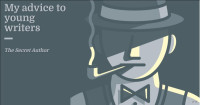
What can right-wing authors do?
thecritic.co.uk – Monday June 23, 2025

Writing has always been a lonely business, publishing a cruel one. We aspiring novelists know that better than anyone. (Which of us hasn’t scrolled through endless Famous Writers Who Got Rejected blog posts, taking a perverse sort of pride in receiving more No Thank Yous than William Golding and J.K. Rowling combined?) Given the sheer number of query letters literary agents are swamped with every week, how is our literary potential — assuming, of course, that we have any — ever to be spotted?
These days, though, there’s an even greater obstacle in our path: left-leaning gatekeepers. And when I say leaning, I mean tumbling. For those of us who don’t subscribe to the latest ideological fads, the chances of seeing our books in the hands of readers who don’t share our name or flat have grown depressingly slim.
When researching agents and publishers for my children’s book, for instance, I found very few who did not explicitly ask for stories by or at least featuring disabled, neurodivergent, LGBTQ+, ethnically diverse or feminist voices. If only I’d penned a middle-grade novel about two feisty trans-girls of Nigerian extraction on their first trip to the moon in a wheelchair. Whether masterly or not, my own manuscript, with its podgy, posh, wannabe-centurion narrator, was bound to be dismissed out of hand for its lack of “diversity”. It’s difficult not to become disheartened.
I was therefore delighted when earlier this year The New Culture Forum (NCF) announced its first Literary Festival. It promised aspiring authors both practical guidance and the presence of publishers. Announcing the festival on GB News, the director and founder Peter Whittle said, quite rightly, that there would be no point to it unless it helped non-woke writers to get published: ‘it can’t just be a talking shop.’

Kate McKean on the Nuts and Bolts of the Query Letter
lithub.com – Friday June 20, 2025

A query letter is a cover letter. That’s it. I know it’s not that simple, but I really want to take away some of its power. Yes, sometimes that’s all an agent will see of your work. Yes, that means it has to do a lot in a little space. But trust that agents recognize how hard this part is, and we know how to spot something interesting through all your nervousness and posturing and meaningless typos.
I like to break down queries into several smaller parts so you can tackle them one by one, and then make it your own.
Salutation
First, we start with a salutation. This is a letter, after all. You should address it to someone. Dear Kate is an acceptable salutation. Yes! Even my first name! I don’t care.
If you are not comfortable with that, you can write Dear Ms. McKean. If you are not sure of an agent’s gender, honorific, or marital status, you can write Dear Kate McKean. All fine options! Just avoid assuming a gender binary or anyone’s marital status. Please do not write To Whom It May Concern or Dear Agent. That just makes me feel like another number on your list. If you spell an agent’s name wrong or use the wrong honorific, just take a deep breath. It’s OK! Typos happen! Lots of people think my name is Kate McLean for some reason. We understand. Do not fall on your sword in follow-up emails. You may send an apology email if you must, but queries are hard and we are all human. Try better next time.

What Writing For Kids Taught Me About Killing Off Adults
crimereads.com – Thursday June 19, 2025

In writing for children, suspense often takes the form of whispers. A note slipped across a desk. A shift in a friend’s tone. A secret whispered during a sleepover. When I dove into writing an adult thriller, those whispers darkened into something more sinister: gaslighting, betrayal, sabotage. Humans hurting other humans on purpose, in terribly cruel ways. Are You My Mother? is a far cry from The Perfect Mother, to be sure, but leaping from one genre to the other wasn’t as arduous as you might think. In many ways, writing for kids taught me exactly what I needed to know to write for adults, especially when it came to thrillers.
The tools, after all, are remarkably similar. It’s the stakes—and the monsters—that change.
Pacing Is Non-Negotiable
Young readers are merciless. If a book fails to grip them right off the bat, that’s it. They’re done. In writing middle grade and YA novels, I learned this quickly. Each scene had to earn its place. Every page had to pull its weight. Long internal monologues or quiet ruminations? Forget it. Momentum was king.
This same discipline became essential when I turned to writing a thriller. In this genre, pace isn’t simply about avoiding boredom; it’s about tension. The plot must press forward, dragging the reader along whether they like it or not. Whether it’s a dead body on page one or a marriage unraveling by chapter three, the story’s engine has to stay hot. Writing for kids taught me how to keep that engine running. When in doubt, I cut ruthlessly, the way years of facing impatient twelve-year-olds trained me to do.

My advice to young writers
thecritic.co.uk – Sunday June 15, 2025

You are, let us say, a “young writer” on the south side of 40, chastened by the findings of the latest industry survey — these show that the mean authorial salary is around £7,000 p.a. — but with your first book contract lying on the desk before you.
The Secret Author would like to congratulate you, whilst proffering a few tips on how you might be able to sustain the career on which you have so optimistically embarked.
Civility is all. The old adage about being polite to the people you meet on the way up as you may very probably meet them again on the way down was never truer than on Grub Street.
Have a smile ready for the shy girl checking the proofs at the Literary Review: she will doubtless end up editing Vogue. The junior assistant who brings in the tea at Front Row is almost guaranteed to be controller of Radio Four 30 years hence.
The same rule applies to book reviewing. The author of the feeble novel you trashed in 2019 will, inevitably, be judging the literary prize for which your darling work is entered in 2029; no slight is so mild that it won’t be repaid with interest decades down the line. The Secret Author is still having trouble with a woman whose book he made the mistake of mildly disliking back in 1995.
Watch your politics. Whatever your private ideological leanings, always publicly proclaim an attachment to the left-liberal Guardian/New Statesman/London Review of Books line. Nobody ever got anywhere in the modern literary world by saying that they voted for Brexit or claiming that Nigel Farage is unfairly maligned.
Similarly, make sure you return publishers’ diversity surveys with all the right boxes ticked. If you were privately educated and went to Oxbridge, either keep quiet about it, make wry, self-deprecating excuses, or say things like “at least at college you could meet real people for the first time”.
Notwithstanding the previous paragraph, always try to write for right-wing newspapers and magazines instead of left-wing ones. The former pay better, do so on time, tend not to muck you about editorially and give better parties.

Five top tips for adapting a short story into a novel
scottishbooktrust.com – Saturday June 14, 2025

Former New Writers Awardee and recently published author Alessandra Thom shares her top tips for adapting a short story into a novel.
The step from writing short stories to novels can seem insurmountable. Writing a short story of a few thousand words is vastly different from a novel of tens or hundreds of thousands. If a short story is a drop of water, a novel is the loch it falls into. But if you can write a short story, you can write a novel. All the elements, though different, are there: building suspense, developing character, creating a compelling plot and a vibrant setting, utilising themes and motifs.
I wrote my first novel by taking a short story I’d already written and adapting it. Here are my five top tips to help you do the same.
Read, re-read, then read again
Read your short story from beginning to end, then read it again. If you can, print it out so you don’t fall into editing it. Go over it with a pen, or add comments on your computer, highlighting moments you think are intriguing. These could be moments where it’s evident you’re only seeing one side of a character, or moments where there is a plot door open that your characters don’t walk through, or simply moments that make you feel something.
You’ll learn what kind of novel you want to write by discovering what resonates with you, and what opportunities excite you.

10 Novels Agents Have Seen a Billion Times, and How to Make Yours Stand Out
electricliterature.com – Saturday June 14, 2025

It is not easy to write a book or get published. I’ve been a literary agent for almost 20 years, and I’ve written six books myself, most of which are tucked away in a drawer. As an agent, I receive hundreds of query letters every month, all vying for a spot on my list and a chance to go out to editors to see if they’ll get published, too. It’s daunting to say the least.
The first battle is figuring out what to write. Clearly everything has been done before, no? I see familiar concepts and tired storylines every day. But if there’s nothing new under the sun, how can writers stand out to agents and editors while also giving readers what they want and maybe taking advantage of trends?
There’s so much to say on this topic that I basically wrote a whole book about it. Writing Write Through It: An Insider’s Guide to Publishing and the Creative Life helped me better understand how writers can navigate the weird, opaque, and confusing publishing landscape. There are no shortcuts or sure things, but my bird’s eye view of the industry has given me some insight, starting with what to write.
Way back in 2017, I wrote about the novels literary agents see all the time. No more zombies, I said back then. Now, times have changed! You can write a zombie novel if you want! It’s time for an update. I’m back to tell you about 10 novels that fill agent’s inboxes these days, but also how you can make yours stand out from the crowd. You can write anything you want. The key is to think about the reader, too.

The Horror of a Border: Laura Elliott On Writing the Abject
crimereads.com – Saturday June 14, 2025

It’s perhaps the question every horror writer dreads being asked the most, yet it happens with alarming frequency. Recently, this question was asked by my mum, a woman who, by her own admission, “doesn’t like anything that couldn’t be real”. Nevertheless, a couple of months ago she gamely read an advance copy of my debut horror novel, Awakened, and then called to ask me: why?
It was a question I’d expected, and on that afternoon, phone in hand as I reorganized my kitchen cupboards, my first impulse was to reassure her that my fascination with horror came from a desire to understand the darker impulses of humanity, rather than because I harbored any disturbing proclivities towards violence myself.
However, after I hung up the call, I began to think a little more deeply about why horror has always drawn me in. What is it about this particular genre that keeps on pulling me back?
Certainly, as a disabled woman, on the face of it horror isn’t the easiest genre to find a comfortable home in. It’s a place where disability is often used as a lazy “narrative prosthesis”—or visual shorthand—for moral or social decay. Where women suffer gratuitously, and sometimes sexually, at the hands of monstrous men.

The Rise of Indie Authors: Why Self-Publishing is Booming in 2025
rollingstone.co.uk – Friday June 13, 2025

For decades, the overarching umbrella genre of fiction has continued to dominate the bookish community. While it remains considered the most popular form of literature, how authors produce and publish their work has significantly shifted.
As reader behavior fluctuates and accessibility to technological advancements increases, these systemic changes power a surge in independent fiction publishing.
Out with Gatekeeping, In with Algorithms: A Modern Publishing Economy
The need for traditional fiction publishers and the print market has declined since 2018. Fortunately, this drop did not indicate that consumers were no longer interested in reading books. Instead, seasoned authors ascribe the decline to a rise in self-publishing practices. Self-publishing empowers indie authors to surpass conventional publishers and spread their written works more directly. Although many might assume e-books would hold their ground, the comprehensive electronic book market for legacy publishers has also endured a downturn. That said, the growing prominence of digital audiobooks somewhat counterbalances this slump.
Publishing platforms like Wattpad, Vella, Ream, and Amazon’s Kindle Direct Publishing (KDP) have removed most of the friction associated with regular fiction distribution. KDP, in particular, continues to impact book circulation by leveling publishing. This Amazon-bound platform provides authors with direct reader access, allowing them to expand the exposure of their pieces.

The broken midlist: why it’s harder than ever to be a ‘moderately successful’ author
artshub.co.uk – Tuesday June 10, 2025

Once the heart of the publishing industry, midlist authors now face dwindling advances, fading support, and a market obsessed with viral hits.
In 2025, the publishing industry is increasingly dominated by bestsellers and viral sensations, leaving midlist authors – those who produce consistently solid but not blockbuster titles – struggling to maintain their careers. The traditional model, where publishers nurtured midlist authors with the hope of building them into future stars, is eroding.
The impact on the broader publishing landscape is clear, with countries like Australia experiencing some of the most significant consolidation it has ever seen.
The case of the vanishing midlist author
Historically, midlist authors have formed the backbone of the publishing industry, providing a steady stream of reliable titles that, although not topping bestseller lists, contribute to a publisher’s financial stability. However, recent trends indicate a decline in support for these authors. Publishers are increasingly focusing resources on potential bestsellers, often at the expense of midlist titles. This shift is partly due to the high costs associated with marketing and distribution, which are now being allocated more selectively
The Penguin Random House antitrust trial revealed that only 35% of its books are profitable, with just 4% accounting for the majority of profits, highlighting the industry’s reliance on a few high-performing titles.

On feeling energized by rejection
thecreativeindependent.com – Friday June 6, 2025

Author and literary agent Kate McKean discusses switching between professional hats, trying again and again while knowing that she might fail, and keeping her eyes on her own page.
You wanted to be a writer. Why did you become a literary agent, where you’re dealing with other people’s writing all day?
I have wanted to be a writer since I was 8 years old. And once I got to college, my sister, who was in publishing at the time, was like, “I don’t think you want to be a high school English teacher when you grow up. I think you should get an internship at the university press at your college.” So I did. I got an inside look at how books were made, and I was like, “This is something I can do while I write so that I won’t be a starving artist.” Because I was never going to be a starving artist. I just like eating. I knew that as a literary agent I would have a lot of freedom in my career, and that I eventually could even work for myself. I wouldn’t have to work in New York. I could just do anything I wanted. And that has turned out to be true.
Let’s talk about side hustles and the freedom that has allowed you. In addition to agenting, you have your writing and your newsletter. How do you juggle it all?
However I can. I’ve been an agent for almost 20 years so I can be choosier with the projects I take on because of where I am in my career. I have a lot of clients who are very well-established. I don’t have to hustle quite as much on my agent side, so I have the freedom to do the writing side as I see fit, whether that’s at 6:00 in the morning, or 6:00 in the evening, or 2:00 in the afternoon…
Does your boss have any issues with that? Or are you effectively an independent contractor, and as long as the work gets done, you can do whatever?
I’ve effectively always been an independent contractor, and Howard Morhaim has been my boss and mentor now for almost 20 years, and he’s not over my shoulder checking my work. He would be if there was a problem. But luckily, that hasn’t been the case in many, many years. And as long as my clients are happy and the money is coming in, for me and him and my clients, then it’s fine. We’re very close. It’s a wonderful relationship.
Get the free newsletter | Submit a news item or article | Get Writers' News for your website





